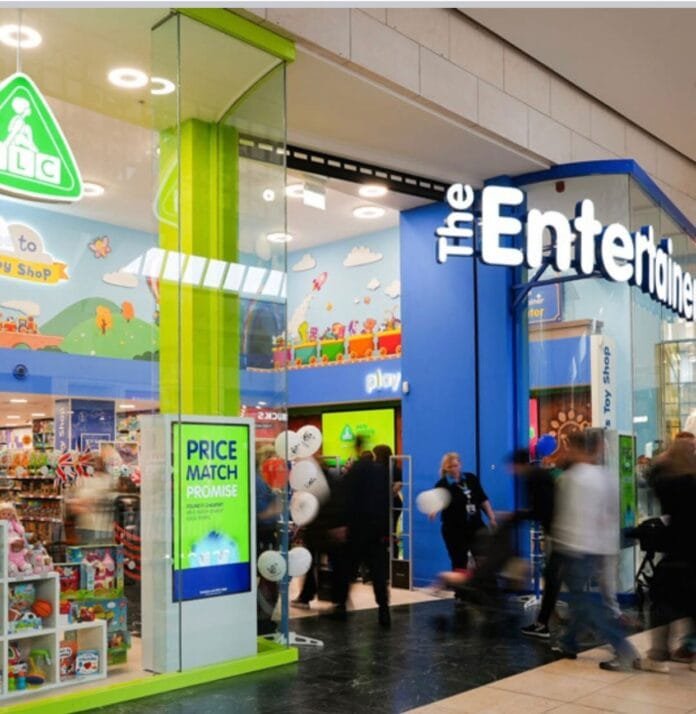The founders of the UK’s largest toy shop chain are stepping aside, but not in the way most high street success stories end. Gary and Catherine Grant, who opened The Entertainer in 1981 with a single borrowed shop unit in Amersham, Buckinghamshire, are transferring 100% ownership of their 160-store business to an employee ownership trust.
This move hands nearly 2,000 workers a stake in the company’s future profits and a formal say in how it is run. It also ensures the Grants exit without selling to an outside buyer, a decision they say protects the ethos they have built over four decades. “If the business had been sold just for money, that would not have been passing on the baton in the way in which the family would have wanted,” Gary Grant told the BBC.
With pre-tax profits of £6.7 million for the year to January 2024 and no long-term debt, The Entertainer is well positioned to make the transition. That financial health means the Entertainer employee ownership trust can fund the family’s payout over time without bringing in outside equity — a critical factor in making the model viable.
Why This Move Matters in UK Retail
Employee ownership is not new in Britain. The John Lewis Partnership, Richer Sounds and Aardman Animations have long used variations of the model. But transferring an established, multi-location retailer like The Entertainer into an employee-owned retail UK trust is rare.
Most chains facing succession either pass to the next generation, sell to a competitor, or bring in private equity. By adopting the toy store employee ownership model, The Entertainer becomes one of the largest UK retailers to take this route — making it a valuable case study for others in the sector.
Andrew Murphy, The Entertainer’s chief executive since 2022 and a former John Lewis executive, knows both the advantages and the limits of such a structure. “Assets cannot be extracted and sold for personal gain, giving everybody in the company a chance to earn an upside,” he said. “But it can limit the ability to raise external funding.”
The Factors Driving the Entertainer EOT UK Toy Retailer Decision
Several forces likely influenced the Grants’ decision to create the Entertainer EOT UK toy retailer structure:
- Succession reality: Two of their four children work in the business but have “other plans for their lives.”
- Cultural preservation: A trade sale risked eroding the brand’s values and operating principles.
- Resilience track record: The Entertainer survived the 2008 financial crisis, pandemic lockdowns, and the rise of e-commerce.
- Debt-free position: The absence of long-term debt makes the benefits of employee ownership trust easier to realise.
What Other Retailers Can Learn
- Retention as a Competitive Advantage
Employee ownership can hardwire loyalty. Nearly 400 Entertainer employees have over 10 years’ service; 50 have 20 years or more. In a sector where annual turnover often exceeds 50%, that stability is both a cost advantage and a customer service asset. - Differentiation Through Ownership
Positioning as an employee-owned retail UK chain offers a unique market message. It can build trust with customers, suppliers, and landlords. - Succession Without a Sale
The toy store employee ownership model provides an alternative to private equity or trade sales, preserving independence and values. - Governance Discipline
The model requires formal processes and transparency, which can improve operations but must be balanced against decision-making speed.
The Risks and Limits
- Capital Constraints: Without equity investors, funding store rollouts or refurbishments depends on cash flow or debt.
- Slower Strategic Pivots: Broader stakeholder input can slow decision-making.
- Profit Pressure: The benefits of employee ownership trust hinge on sustained profitability. Murphy expects “meaningful” payouts only from 2026–27.
- Leadership Transition Risks: Culture can be difficult to preserve without founder involvement.
Industry Signals
Suppliers may value a long-term, stable partner, especially in seasonal categories.
Competitors will monitor whether employee ownership delivers improved service and staff morale.
Landlords might see trust-owned tenants as lower risk than leveraged retailers.
The Entertainer’s expansion model — partnering with Tesco (850 store-in-stores) and Matalan (140 concessions) — shows how an employee-owned retail UK chain can grow without heavy lease exposure.
Values at the Core
The Grants’ Christian ethos has shaped the business for decades. Stores do not trade on Sundays, and 10% of annual profits go to charity. The company famously refused to sell Harry Potter merchandise in the 2000s over concerns about “darkness.”
These principles will remain under the trust. “We would have been very concerned selling to a business that has a completely different set of values to the values of the Entertainer which we’ve built over the last 44 years,” Gary Grant said.
What’s Next for the Entertainer Employee Ownership Trust
The next three to five years will show whether the Entertainer toy shop employee ownership approach can be sustained and scaled. Key indicators:
- Profit trajectory: Can margins support payouts and reinvestment?
- Staff engagement: Will the ownership stake boost retention?
- Competitive positioning: Will customers notice — and value — the change?
- Partnership performance: Will Tesco and Matalan expansions continue?
If The Entertainer succeeds, the Entertainer EOT UK toy retailer model could inspire other founders to consider the toy store employee ownership model as a viable, values-led exit plan.
For now, it stands as one of the most closely watched experiments in employee-owned retail UK, with lessons that go far beyond the toy aisle.



